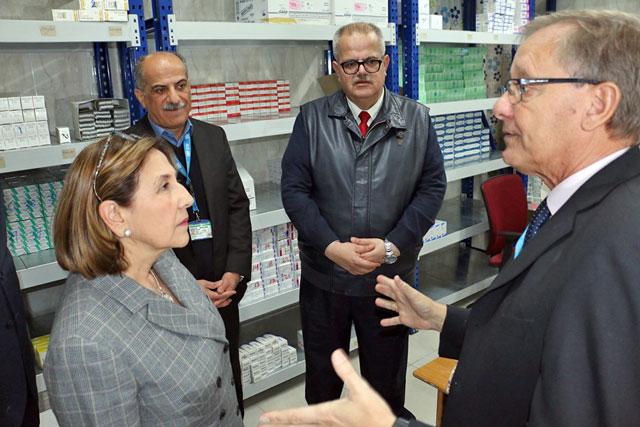You are here
MSF clinics in Irbid treating ‘silent killer’ illnesses among Jordanians, Syrians
By JT - Dec 27,2016 - Last updated at Dec 27,2016
AMMAN — “Treating non-communicable diseases is as important as treating a gunshot wound,” says Marjan Besuijen , a project coordinator for the international medical charity Médecins Sans Frontières/Doctors without Borders (MSF).
From their two clinics in Irbid Governorate, 80km north of Amman, this is the second year that MSF has been treating people suffering from non-communicable diseases, with 69 per cent of their 3,700 patients being Syrian refugees, while the rest are vulnerable Jordanians, according to an MSF statement.
Patients are provided with free treatment and follow-up care for a variety of non-communicable diseases, which Besuijen referred to as “silent killers”.
These illnesses can develop slowly and progress over a long period of time, often without the patient realising, the statement said.
Amongst some of the most common are diabetes, hypertension, asthma, cardiovascular diseases and chronic obstructive pulmonary disease.
Such illnesses are among the most common causes of death in the region, and particularly in Jordan, according to MSF.
The organisation’s project is run in collaboration with the Health Ministry and the Arabian Medical Relief Society. It is aimed at easing “the immense strain” on the Kingdom’s health and social services caused by the large number of Syrian refugees who have sought shelter in Jordan.
Over 1.3 million Syrians currently live in Jordan, according to official estimates. Only 655,675 Syrians are registered with the UNHCR as refugees.
As well as the physical cost of ill-health, Besuijen explains that the financial cost of accessing healthcare can be crippling for many Syrian refugees.
“Many Syrians end up exhausting their life savings to pay for long-term medical care, while others are forced to search for alternative means to access much-needed but expensive medical treatment,” she said.
Shoaib Muhammad, the MSF medical coordinator, noted that there are “very high incidences” of non-communicable diseases among Syrian refugees, but much more needs to be done to help both vulnerable Syrians and Jordanians:
“This includes reducing the prices of essential medicines in Jordan, and investment by other organisations in their response to people with non-communicable diseases,” he said.
Syrian refugees can also suffer from a number of mental health problems as a result of traumatic experiences, the MSF statement said.
Since April 2016, MSF has also provided over 1,600 psychosocial support sessions for Syrian refugees.
Related Articles
Doctors Without Borders/ Médecins Sans Frontières (MSF), in cooperation with the Health Ministry, on Tuesday inaugurated its first clinic for non-communicable diseases in Irbid city.
AMMAN — Médecins Sans Frontières/Doctors Without Borders’ (MSF) Jordan Office on Saturday said that it has been readjusting its operations i
AMMAN — The Spanish embassy in Amman on Monday announced it would fund the operating costs of two UNRWA health centres in Jordan.Spain will














